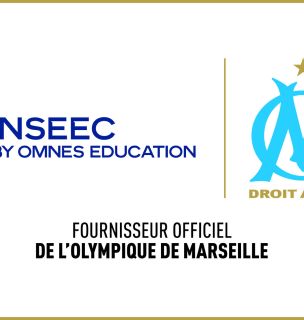Designed for international students preparing a career in finance.
An MSc in International Finance to conquer the global financial markets
“The first traces of finance date back 5,000 years and it has been associated with the development of business and the world ever since.
Over the past 30 years, international finance has been strengthened by rapid globalization. Therefore, 21st century businesses will surely always need the advice of qualified financial experts capable of supporting businesses around the world.
The Msc2 International Finance is designed for international students embarking on a career in finance. Fluency in English is a prerequisite for admission. It is the natural continuation of the Msc.1 in International Finance. The program provides students with the theoretical tools necessary to master the practical problems of financial management of business entities around the world. The main pedagogical emphasis is on analysis, with extensive use of open discussion and case studies to link theory to observable examples.
Delivered entirely in English by a team of finance professionals with extensive professional and academic experience, this degree is certified by the highest level of the French National Register of Professional Qualifications (RNCP level 7.)
This international finance program welcomes students with a wide range of experiences and backgrounds. They often share similar values and qualities such as high intellectual ability, professional experience, determination and courage to undertake full-time study in a foreign country. Many are culturally aware global citizens with the potential to be the business innovators and thought leaders of the future.
The Bloomberg terminal is used throughout the course and also as a stand-alone class. For incoming students who have not yet earned the BMC Bloomberg Market Concepts, additional financial lab hours are assigned for this additional certification. “
Ellen Kountz, Program Director

A 1 or 2 year degree to become an experienced professional in the international finance market
Holders of a BAC+3 can apply for the first year of the MSc, and holders of a BAC+4 can apply directly for thesecond year.
This training, in 1 or 2 years, has for objectives :
- After familiarizing yourself with the mechanisms of the markets, apply the characteristics of securities such as: stocks, bonds, currencies, commodities
- Calculate the return on investment, calculate the cost of capital, estimate the impact of financial leverage on performance
- From internal financial data, set up and monitor the various forms of dashboard (strategic, management, operational) and calculate budget forecasts
- Continue and deepen the e-learning courses in English on specialized computer tools and terminals for financial market operators
How to apply to the MSc International Financial Analyst at INSEEC?
The required prerequisites
The conditions for accessing the certification system (excluding VAE) are:
- For entry into the 1st year of the course (MSc 1): to have validated 180 ECTS (level 6, License or equivalent) in the field of marketing, commerce, management or communication. He must have a professional level of English for the English-speaking program.
- For entry into the 2nd year of the course (MSc 2): to have validated 240 ECTS (level 6, Master 1 or equivalent) in the field of marketing. He must have a professional level of English for the English-speaking program.
- Executive training is subject to specific prerequisites with professional experience taken into account.
Want to know more about the MSc International Financial Analyst programme?
Sign up for an Open Day!
Would you like to know more about the admission conditions for our programme in International Financial Analyst?
Courses
The courses presented below are given as an example, they may vary slightly depending on the teaching campus. The course content is adapted each year to market developments and updated before the start of each new school year.
1st year courses
BASIC COURSES – 1ST YEAR
International Taxation
International Accounting Fundamentals
International Finance
Bloomberg: certification & case study
Investment Banking
Managerial Accounting
Strategy for CFOs
International Financial Analysis
Derivatives in portfolio management
Financial Reporting & Scorecard
Risk Management
Private Equity
Real Estate Finance
Excel & VBA
CROSS-CURRICULAR COURSES 1ST YEAR
Back-to-school seminar
- Hourly volume: 7 hours
- Evaluation method: not evaluated
Project management
For all our students, this module is also noted and integrated into all our training courses.
Our soft skills modules are designed to raise students’ awareness of the notion of corporate behaviour and to help them develop their professional profile. They are based on testimonials from professionals, group work and role-playing.
This course dedicated to soft skills is called Boost U and offers an immersive and digital experience through a community of learners and scientific experts and a platform offering multiple cross-disciplinary documentary resources.
- Hourly volume: 21 hours
- Evaluation method : individual file
Soft skills
The module allows students to put into practice the skills and know-how integrated during the courses they follow. It consists in the realization of a personal project or a project entrusted by a company with a real need for group work.
The project is presented to a jury of professionals and qualified speakers.
- Hourly volume: 31 hours
- Evaluation method: defense + collective report
Conferences / visits
INSEEC Mindset is an annual conference series, both French and English-speaking, covering a wide range of topical issues. Hosted by professionals from all walks of life, from prestigious companies to start-ups, these conferences offer students the opportunity to stimulate their curiosity, to open up to cross-disciplinary subjects and to gain new points of view. Students are required to attend at least two lectures during their academic year.
In addition to these lectures, students can also take educational tours offered by the faculty.
- Hourly volume: 10 hours
- Evaluation method: not evaluated
Bloomberg Concepts Markets
E-learning course taught in English / Bloomberg Market Concepts (BMC) is a self-paced e-learning course that provides an interactive introduction to the financial markets.
- Hourly volume: 10 hours
Closing seminar
- Hourly volume: 14 hours
- Evaluation method: individual report
2nd year courses
2nd YEAR INTERNATIONAL FINANCIAL ANALYST COURSES
STRATEGIC REVIEW
Advanced Managerial Accounting
- This course explores advanced topics in managerial accounting, focusing on strategic decision-making and performance evaluation. Students learn how to analyze financial information to support effective resource allocation and optimize business performance.
International Financial Analysis
- This course delves into the complexities of analyzing financial statements in a global context. Students gain a deeper understanding of international accounting standards, exchange rate fluctuations, and cultural factors that impact financial reporting and analysis.
Corporate Finance
- This course provides a comprehensive understanding of financial management in a corporate setting. Topics covered include capital budgeting, capital structure, dividend policy, and risk management. Students learn how to make strategic financial decisions to maximize shareholder value.
Mémoire de Recherche Appliquée
- The applied research dissertation aims to develop analytical and reflective skills around a managerial issue. It provides an opportunity for students to demonstrate their rigor in analyzing a problem or managerial issue and formulating operational recommendations. The research dissertation reflects the student’s research work and enhances the professionalism of the course.
CONTROL AND MANAGEMENT
Blockchain & Fintech
- This course explores the revolutionary technologies of blockchain and fintech. Students learn about the underlying principles, applications, and potential disruptions brought about by these technologies in the financial industry. Topics covered include smart contracts, decentralized finance, and the impact of digital currencies.
Data analytics in Finance
- This course equips students with the tools and techniques to extract meaningful insights from financial data. Students learn data manipulation, visualization, and statistical analysis techniques to support financial decision-making and risk management in an increasingly data-driven world.
Risk Management
- This course focuses on identifying, assessing, and managing financial risks faced by businesses. Students learn various risk measurement techniques, including value-at-risk and stress testing, and explore strategies for mitigating risks through hedging, diversification, and insurance.
Excel, VBA
- This course provides hands-on training in utilizing Microsoft Excel and Visual Basic for Applications (VBA) for financial analysis and modeling. Students learn advanced spreadsheet techniques, automation, and programming to enhance their financial modeling and decision-making capabilities.
Advanced Derivatives and Alternative Investments
- This course delves into complex financial instruments such as derivatives and alternative investments. Students explore topics such as options, futures, swaps, hedge funds, and private equity. They develop a deep understanding of valuation techniques and risk management strategies associated with these instruments.
Quantitative Methods
- This course introduces students to quantitative techniques used in financial analysis and decision-making. Topics covered include statistical analysis, time series analysis, regression modeling, and optimization. Students gain the skills necessary to effectively analyze and interpret financial data.
FINANCIAL ACTIVITIES
Economics
- This course provides a foundational understanding of economic principles and their application in the financial industry. Students explore topics such as supply and demand, market structures, macroeconomic indicators, and monetary and fiscal policies. They develop a framework for understanding the economic factors influencing financial markets.
Portfolio Management
- This course focuses on the theory and practice of portfolio management. Students learn techniques for constructing and managing investment portfolios to achieve specific financial objectives. Topics covered include asset allocation, portfolio diversification, performance evaluation, and risk management.
Private Equity
- This course delves into the world of private equity investments. Students learn about the structure and mechanics of private equity funds, deal sourcing and evaluation, due diligence, and post-investment strategies. They gain insights into the unique characteristics and challenges of investing in privately held companies.
Fixed Income
- This course explores fixed income securities and markets. Students learn about bond valuation, yield curve analysis, and interest rate risk management. They gain an understanding of the different types of fixed income instruments and their role in investment portfolios.
Equity Investments
- This course focuses on equity securities and equity markets. Students learn fundamental and technical analysis techniques to evaluate stocks and make investment decisions. They explore topics such as equity valuation, market efficiency, and behavioral finance.
FINANCIAL RECOMMENDATIONS AND COMMUNICATION
Ethical and Professional Standards
- This course emphasizes the importance of ethics and professionalism in the financial industry. Students study ethical standards and codes of conduct established by professional organizations. They develop an understanding of ethical decision-making and the implications of unethical behavior in financial settings.
Corporate Social Responsibility and Social Investment
- This course explores the concept of corporate social responsibility (CSR) and the integration of social and environmental considerations into investment decisions. Students examine sustainable investment strategies, impact investing, and the measurement and reporting of social and environmental performance.
Financial Reporting & Analysis
- This course explores the concept of corporate social responsibility (CSR) and the integration of social and environmental considerations into investment decisions. Students examine sustainable investment strategies, impact investing, and the measurement and reporting of social and environmental performance.
Mergers & Acquisitions
- This course examines the strategic and financial aspects of mergers and acquisitions (M&A). Students learn about M&A valuation techniques, deal structuring, due diligence, and post-merger integration. They explore the motives behind M&A transactions and the challenges involved in successful execution.
CROSS-CURRICULAR COURSES 2ND YEAR
Back-to-school seminar
- Hourly volume: 7 hours
- Evaluation method: not evaluated
Mission consulting
In the continuity of the “Project Management” module in MSc1, the consulting missions that our MSc programs propose come from client companies with problems related to their activity and/or their market.
As part of the pedagogical framework, these missions are carried out in teamwork, are graded and presented to a jury composed of coaches and members of the companies that commissioned the mission.
Each student is expected to work on at least one consulting assignment during their MSc program.
- Hourly volume: 121 hours
- Evaluation method: defense + collective report
Leadership Lab
This is the final project on which all MSc2 students work throughout the year.
Beginning with Leadership Week, a week during which our students meet with top leaders and company executives from their sector on the notion of leadership, the Leadership Lab is composed of a leadership project, leadership pitch and leadership study, all three graded.
The Leadership Lab is presented in detail to the students during their first week in the MSc2.
- Hourly volume: 35 hours
- Evaluation method: defense + collective report
Soft skills
For all our students, this module is also noted and integrated into all our training courses.
Our soft skills modules are designed to raise students’ awareness of the notion of corporate behaviour and to help them develop their professional profile. They are based on testimonials from professionals, group work and role-playing.
This course dedicated to soft skills is called Boost U and offers an immersive and digital experience through a community of learners and scientific experts and a platform offering multiple cross-disciplinary documentary resources.
- Hourly volume: 21 hours
- Evaluation method : individual file
Conferences / visits
INSEEC Mindset is an annual conference series, both French and English-speaking, covering a wide range of topical issues. Hosted by professionals from all walks of life, from prestigious companies to start-ups, these conferences offer students the opportunity to stimulate their curiosity, to open up to cross-disciplinary subjects and to gain new points of view. Students are required to attend at least two lectures during their academic year.
In addition to these lectures, students can also take educational tours offered by the faculty.
- Hourly volume: 10 hours
- Evaluation method: not evaluated
Closing seminar
- Hourly volume: 14 hours
- Evaluation method: individual report
2 start dates per year and varying study rhythms
There are two openings per year, in February/March and September/October. To check the opening of each intake, contact the admissions department directly.
The rhythm of the courses may differ depending on the campus and whether the training is carried out under an internship agreement (initial) or a professionalization/apprenticeship contract (continuing).
The work-study contract must be signed for a period of 12 months (MSc 2), 24 months (MSc1 + MSc 2) or 18 months for the staggered start of March (continuation of studies in MSc2).

Career opportunities after an MSc in International Financial Analyst
- Middle office manager
- Deputy CFO
- M&A trainee
- Tax accountant
What business skills are developed?
The objectives in terms of skills are to be able to:
- Analysis of strategic company data
- Control and management of the company’s activity
- To ensure the sustainability of the company’s activity
- Issuance of financial recommendations and control of communication
This program delivers the RNCP Level 7 certification“Expert in Financial Analysis“, NSF codes 313 and 314, awarded by INSEEC MSc (INSEEC EXECUTIVE EDUCATION, CEE-SO, CEE-RA, CEFAS, MBA INSTITUTE), registered under number 35007 in the RNCP (Répertoire National des Certifications Professionnelles) by decision of the Director General of France Compétences on 14 October 2020.
The certification is obtained by capitalisation of all the blocks of skills.
For more details, please consult the online repository: https: //www.certificationprofessionnelle.fr/recherche/rncp/35007
What are the teaching methods?
Teaching methods
- Lectures and interactive courses
- Situational exercises through collective or individual case studies carried out by the students
- Conferences, seminars and educational visits
Evaluation methods
- Individual or group case studies
- Individual and group oral presentations
- Individual and group files
Methods and tools
- The evaluation methods are face-to-face, in the form of continuous assessment or final exams in the form of mid-term exams.
What is the 2024/2025 tuition to enter the programme?
Initial training:
- Entry in MSc1 : 11 950 €.
- Direct entry in MSc2 : 13 350 €.
Continuing education (sandwich course) :
- Training 24 months : 23 950 € HT
- Direct entry in MSc2 : 13 950 € HT
VAE/VAP :
- VAE : 4 200 € HT
- VAP : 850 € HT
International Student Pack: Mandatory fee of 490€ for exclusive support services for international students.
What kind of financial aid is available?
INSEEC offers several financial aid schemes:
- The alternating rhythm, in internship or work-study contract
- The right to training via the CPF
- Partnerships with banking institutions referenced at INSEEC
KEY numbers FOR RNCP QUALIFICATION N°35007 "EXPERT IN FINANCIAL ANALYSIS"
92%
National success rate – Class 2023
97%
Presentation rate – Class 2023
86%
Overall integration rate (140 respondents out of 368) – Class 2022
78%
Satisfaction rate at 6 months – Class 2022
Disabilities
The OMNES Education Group pays particular attention to the societal environment, including the disability dimension. Indeed, we believe that students with disabilities should not have any problems in pursuing their studies and starting a professional career. We accompany them to facilitate their access to the premises, offer them personalized advice as well as adapted accommodations throughout their school career.
Accessibility of premises: all our campuses are accessible to people with disabilities.
To learn more about the OMNES Education Group’s disability policy, click here.
Contacts for disability referents by campus:
Bordeaux : Maxime DOUENS – mdouens@inseec.com
Lyon : Anissa GASMI – agasmi@inseec.com
Paris : Farid HAMAD – fhamad@inseec.com
Chambéry : Clément BERTACCO – cbertacco@inseec.com
Rennes : Laura LE CALVEZ – llecalvez@omneseducation.com
Marseille : Océane VALOTTI – ovalotti@omneseducation.com
News

June 2024
INSEEC hosted the CFNews Grands Prix de la Croissance Externe Sud Ouest for the second year running
Read more




